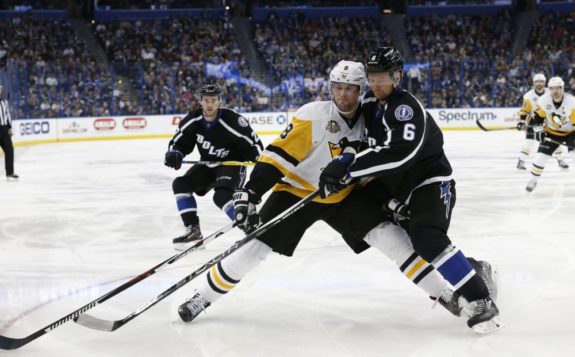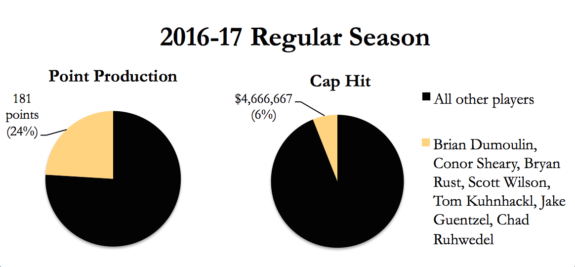Chad Ruhwedel’s signing last week flew somewhat under the radar. Maybe that’s because the day after he signed, the Pittsburgh Penguins moved a few pieces to acquire Ryan Reaves, the notorious enforcer from the St. Louis Blues. Or maybe it’s because it was such a small salary, with Ruhwedel committing for the next three years at the league minimum of $650,000. His low salary, however, is exactly what makes this signing important. The Penguins have plenty of practice with getting the most they can out of players on entry-level contracts. Ruhwedel, who this season demonstrated his potential as a solid defender, will be no different.
Penguins’ Production from Low Cap Hits
In 2015, the Penguins signed defenseman Brian Dumoulin to a two-year contract. The contract was under $1 million per year, because Dumoulin had spent the majority of the 2014-15 season with the Penguins’ minor league affiliate. A signing for $800,000 dollars a year (about one percent of the Penguins’ salary cap) can seem inconsequential. But Dumoulin would, of course, end up being a key part of each of the Penguins’ following two Cups. In the 2017 playoffs, Dumoulin was playing on the top defensive pair, all for a salary not far above the league minimum.

The Penguins are very good at getting high-level production out of players being paid low-level salaries. Look at the 2016-17 season as an example. Ruhwedel, Dumoulin, Conor Sheary, Bryan Rust, Scott Wilson, Tom Kuhnhackl and Jake Guentzel each made under $1 million this past season, and they each were significant parts of the Penguins’ production. Although the seven players combined for under seven percent of the Penguins’ total salary cap, they produced almost a quarter of the team’s total points during the regular season.

The fact that a quarter of the Penguins’ production came from about a fifth of their cap hit was the reason they were so successful. It was also the reason that they were able to successfully retain the salaries of three offensive superstars on their roster.
The Cost of Employing Winners
Winning too much is a good problem to have, but it remains a problem nonetheless. Goaltender Matt Murray finished the season on an entry-level $628,333 contract; he’s heading into the next one earning over three million per year. It’s funny; win back-to-back Stanley Cups and players suddenly think they’re worth something.
Murray won’t be the only player expecting a precipitous raise. The Penguins are most likely going to lose players like Nick Bonino and Chris Kunitz simply because they cannot afford the rates these players will be offered from other teams. Dumoulin and Sheary’s contracts, both under one million each, ended this season; they both received qualifying offers and will almost certainly be seeing raises.

That’s why the Chad Ruhwedel contract is so important. If the Penguins can keep on any of these seven players at continued low costs, it will help them to succeed in the future. Including Ruhwedel, five of these seven will remain with the Penguins on cheap contracts for the 2017-18 season. Add into that other players deeper within the Penguins organization that will be playing on entry-level contacts (Zach Aston-Reese and Daniel Sprong) and the Penguins have a chance at mustering up that same level of production from a similarly small portion of their cap.
The Importance of Low-Cost Production
In the salary cap era, teams need to eke out production from their cheap and entry-level players in order to succeed. The Penguins have a history of doing so. Signing Ruhwedel on for the next three years at an affordable rate is a move that fits with this plan. It helps give the Penguins a chance of maintaining that high production percentage to salary cap percentage that has made them the most successful team in the league these past two years.
To be competitive in the next season, the Penguins need to maintain a similar ratio of points produced by low-salaried players. Right now, it’s up to Guentzel, Rust, Wilson, Kuhnhackl and Ruhwedel to provide that.